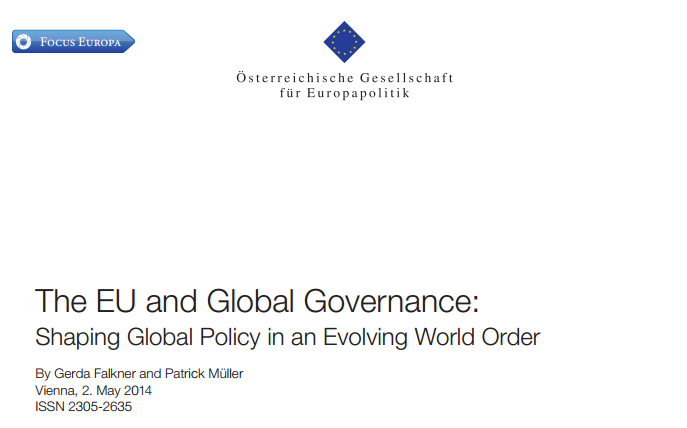Shaping Global Policy in an Evolving World Order
Policy recommendations
- The EU should try to convince national governments to consider increasingly pooling their powers in international organizations, e.g. by aligning member states’ votes with the Commission.
- The EU has to employ its resources wisely. Pursuing its objectives in international organizations in parallel with bilateral efforts focusing on relevant third countries can strengthen its influence.
- The EU needs to build partnerships and contribute to global institutions that provide for a meaningful representation of all major actors, including the BRIC countries.
Abstract
Troubling events in the EU’s neighborhood, most notably the current crisis in Ukraine, dominate its attention. Still, the EU’s international responsibilities transcend its immediate regional surroundings. Urgent challenges facing the European Union today such as the risk of climate change or the stability of financial markets are global in nature, exceeding the problem-solving capacity of nation states and even the EU. While the demand for global governance solutions is rising, the capacity of the EU to shape global policy outcomes in line with its domestic policy solutions faces important limitations. The EU has been able to exercise decisive influence in at least some policy areas, most importantly in writing the rules of the world trade regime in tandem with the US until the 1990s. Yet the emergence of the BRIC countries along with other important changes at the international level increasingly circumscribes EU influence. This policy brief addresses key opportunities and constraints faced by the EU in a changing international system. It also makes recommendations for an effective European role in global governance.
***************************************
The European Union (EU) displays a strong commitment to multilateral solutions and the strengthening of international institutions. As a project of regional integration and peace, the EU can look back at a long history of overcoming national conflicts and divisions in Europe through building joint institutions and fostering cooperation. In that sense, it seems a natural choice that the EU also invests in global institutions, rules, and norms. However, with major political transformations and crisis unfolding in the EU’s neighborhood – including the events triggered by the Arab Spring and the current crisis in the Ukraine – much attention has been given to the EU’s ability to respond to international (security) crises. There can be no doubt that facilitating peace, democratic transition and economic welfare in its neighborhood are important priorities that deserve the EU’s full attention. Still, in an increasingly globalized world the EU’s international responsibilities clearly go beyond its neighborhood. Important challenges facing the EU today, like fighting climate change and ensuring the stability of financial markets, are global, not regional, in nature.
What is more, the EU’s external action is not limited to traditional foreign and security policy, but has become truly multi-dimensional. The EU engages with international organizations on a broad spectrum of policy domains and issue areas. But to what extent has the EU been able to shape global policy outcomes in line with its own domestic policy solutions, rules and values? We addressed this question in a collaborative research project covering ten major EU policy areas with a corresponding regime at the international level.[1]Specifically, we focused on trade policy, agricultural policy, food safety, competition policy, social rights, environmental policy, transport policy, migration policy, nuclear non-proliferation, and financial market regulation.
Our comparative findings suggest that the EU’s ability for exporting its own policy solutions to global policy regimes – including key international organizations like the World Trade Organization (WTO) or the International Labor Organization (ILO) – faces important limitations. Accordingly, the EU finds itself in a situation where it frequently promotes standards that depart from its domestic policies, shields its domestic policies from global pressure, or adapts its own standards to global rules. The EU’s involvement in global governance is thus not a ‘one-way street’ but an interactive process that takes different forms and also feeds back into EU-internal policies.
Yet, the observation that the EU’s capacity to ‘internationalize’ its own policies by exporting them to international regimes is limited does not imply that a strong EU involvement in global governance is not desirable. As we argue below, the EU increasingly depends on global policy solutions and should employ its international influence in a strategic way to shape global policy outcomes (see the policy recommendations).
The Rise of Governance Levels beyond the State: Global Problems demand Global Solutions
Europeans – like citizens in other parts of the world – appreciate global public goods such as a clean environment, food safety in the age of international production chains, and global security. Substantial problems of the established global institutional order notwithstanding, to provide these global goods we increasingly depend on global governance solutions and international cooperation.
Our research shows that rule-making in key policy domains has been increasingly shifting to levels beyond the state and beyond the EU.[2] Focusing on the ten policy areas mentioned above, our main concern was where important rules of a policy originate from[3] Are these rules made by the EU member states, are they made in the EU, or are they made by international organizations like the United Nations (UN) or the Word Trade Organization (WTO)? As figure 1 indicates, the importance of rule-making at levels beyond the nation state has increased significantly over time. A globalized world requires international rules, which are increasingly supplied both at the EU and the global levels. Conversely, the significance of the national level declined, albeit gradually, as key decisions moved upwards. It is important to note, however, that even if the national level is of low significance in a particular area of governance, this does not mean that governments are fully bereft of all powers. They represent their states in the EU’s Council of Ministers and also remain key actors in multilateral institutions – primarily because most international organizations accept only states as members. Moreover, the national level remains central for rule enforcement.
Figure 1: The Significance of Governance Levels in 10 Policies [4]
The EU as an Actor in Global Governance
The EU has strong motivations for shaping global policy outcomes. A close fit between domestic and global policy solutions is in the best (economic) interest of the Union, since it reduces adaptation and information costs for member states while simultaneously providing them with a competitive advantage in global markets.[5] The external projection of European standards may also result from normative motivations when the EU seeks to export its own normative basis, such as democracy, human rights, and the rule of law, as a model for global governance.[6]
On the one hand, the EU may export its policies through its bilateral relations with third countries. Here, the EU can incorporate its own rules and policy solutions in trade and association agreements, relying on the power of its large market and expertise as incentive for rule export to partner countries. The EU constitutes the world’s largest single market. It is not only the world’s biggest exporter of goods and services, but also the biggest market for imports with more than 500 million consumers. On the other hand, the EU can use its presence in international organizations and policy networks to export its policies. Here, the EU exports its policies by injecting its preferences in multilateral negotiations.
Some prominent cases of EU policy export exist, most notably in the area of trade. The EU played a central role alongside the United States (US) in writing the rules of the global trade regime until the mid-1990s. It was a bilateral EU-US deal on lowering tariffs that shaped the outcomes of the 1964-67 Kennedy Round of global trade negotiations by effectively multilateralizing the ‘most favored nation’ principle to the GATT regime (later the World Trade Organization – WTO). During subsequent trade rounds, the EU worked in tandem with the US, shaping the rules of the global trade regime concerning issues like anti-dumping policies and disciplining subsidy wars, as well as in a range of pluri-lateral regulatory codes concluded during the Uruguay Round. Yet in the 2000s, the EU’s influence in the global trade regime has declined, not least due to the rise of Brazil, China and India in the global trading system. While the EU remained an important trade power, it could no longer co-dictate the agenda of WTO trade rounds. The ongoing negotiations between the EU and the US to forge a Transatlantic Trade and Investment Partnership (TTIP) can be read as an attempt to avoid the constraints of the WTO-setting. While some warn that this might undermine WTO negotiations, others suggest that the successful conclusion of the TIPP would create strong incentives to achieve further liberalization steps at the multilateral level.[7]
The EU’s large internal market also facilitated policy export in a number of other market-related areas including various standards for products and services, especially in the domain of transport and environmental policy. Starting in the early 1990s, EU policies on car exhaust emissions were exported to the UN Economic Commission for Europe and became a global reference point. Still, in an increasingly multi-polar world, the EU’s market power has become more circumscribed. In the field of aviation, for instance, the EU faced strong disagreements on global measures to reduce aviation emissions. The EU unilaterally imposed emissions trading on aircrafts flying to and from EU airports through the controversial extension of its emission trading system in 2012. Yet, in the end, the EU succumbed to pressure by several countries including Russia, China and the United States, exempting non-EU airlines from having to pay for their CO2 emissions.
In overall terms, however, EU policy export to international regimes has been a rare phenomenon and was often limited to more technical, less-politicized aspects of a policy. Major hurdles for EU policy export are located at the international level and can be summarized as follows:
- Procedures in international organizations: With few exceptions – most prominently the WTO – international organizations only allow states as members, at best giving observer status to the European Commission and at times to other EU actors. Simultaneously, legalization and judicialization of international regimes may take decisions out of the hands of the EU or its member state governments.
- Global constellation of preferences: The EU’s capacity for policy export is circumscribed when its preferences clash with those of other powerful actors like the US, but increasingly also the BRIC countries (Brazil, Russia, India, and China).
At the same time, the EU’s ability for policy export can be undermined by factors pertaining to the EU itself:
- A lack of EU-unity: Internal EU-conflicts (among the member states or within supranational EU institutions like the European Commission) undermine its position in international negotiations. This is further complicated by the complex distribution of EU-competences for external representation (particularly in areas of shared internal competences between the EU and its member states).
- A lack of international appeal of EU-standards: From a global perspective, the EU constitutes a club of rich countries with high regulatory standards that are difficult to meet for most other countries.
Conclusion and Policy Recommendations
Both the EU and individual governments are well advised to make an active contribution to global governance in light of urgent international challenges and threats. For the benefit of increased joint leverage, the 28 member states’ role will often have to be an indirect one via the EU.
1. From the perspective of the individual countries and their citizens, it seems crucial to positively acknowledge the progressive role of governance beyond the state. Essential problems could not be solved without that. The fight against climate change can serve as a prominent case in point. Individual EU member states, or even the Union as a whole, may adopt ambitious policies to fight climate change. Yet, to be effective, climate change policies require a multilateral effort involving all major emitters of greenhouse gases.
In fact, our research highlights that the nation state no longer suffices to safeguard the well-being of citizens in neither theory nor practice. Opposed to what populist allures may insinuate, e.g. in campaigns for the forthcoming EP elections, without the EU, the individual member states would by no means stand alone as powerful shapers of their own fate. By contrast, they would still depend on international cooperation, but they would have much less influence on global policies.
2. To enhance the EU’s international standing and influence in global governance we propose the following:
If the EU wants to gain leverage, it should try to convince national governments to consider increasingly pooling their powers in international organizations. This may include that member states agree to align their votes with the Commission or that the EU becomes a member of one or the other international organization where it is so far only an observer or not at all admitted. The accession of the EU to international organizations requires the support of the Council, where member states have in the past been reluctant to support such initiatives.
Our findings, moreover, suggest that the EU has to employ its resources wisely to shape global policy outcomes in an increasingly multi-polar world. Tailor-making its strategy with the specific circumstances at hand, the EU should combine vertical and horizontal export modes. Pursuing its objectives in international negotiations as well as through parallel efforts with relevant third countries can strengthen its influence.
Finally, our research suggests that the EU should be aware of its limitations in an increasingly multi-polar world. To make an active contribution to global governance in key policy domains, the EU needs to build partnerships and contribute to global institutions that provide for a meaningful representation of all major actors, including the BRIC countries. Working in tandem with the US is no longer sufficient to shape global governance in an evolving world order.
1) Falkner, G. and Müller, P. (eds) (2014) EU Policies in a Global Perspective: Shaping or Taking International Regimes, London and New York: Routledge.
2) On the need to reform existing global governance institutions see: Stewart, P. (2014) ‘The Unruled World: The Case for Good Enough Global Governance’, International Affairs, 93(1): 58-73.
3) In the framework of our project, 15 policy specialists evaluated changes in the significance of the national, EU, and global governance layers for the ten above-mentioned policies.
4) Simplified graphic. Notes: (*) denotes extrapolation. The three levels of significance are not mutually exclusive, hence increase on one level does not necessarily imply reduced significance of other levels, for more detailed information see Falkner and Mueller (2014).
5) Drezner, D.W. (2005) ‘Globalization, Harmonization, and Competition: the Different Pathways to Policy Convergence’, Journal of European Public Policy 12(5): 841-859.
6) Manners, I. (2002) ‘Normative power Europe: A contradiction in terms?’, Journal of Common Market Studies40(2): 235-258.
7) See McGee, B. TTIP and TPP: The Catalyst fort the WTO’s Deal in Bali?, Atlantic Council, 11 December 2013, available online: www.atlanticcouncil.org/blogs/ttip-action/ttip-and-tpp-the-catalyst-for-the-wto-s-deal-in-bali.
ISSN 2305-2635
The views expressed in this publication are those of the authors and not necessarily those of the Austrian Society of European Politics or the organisation for which the authors work.
Keywords
European Union external relations, global governance, international politics
Citation
Falkner, G., Müller, P. (2014). The EU and Global Governance: Shaping Global Policy in an Evolving World Order. Wien. ÖGfE Policy Brief, 7’2014








